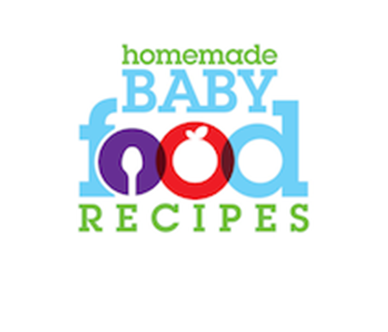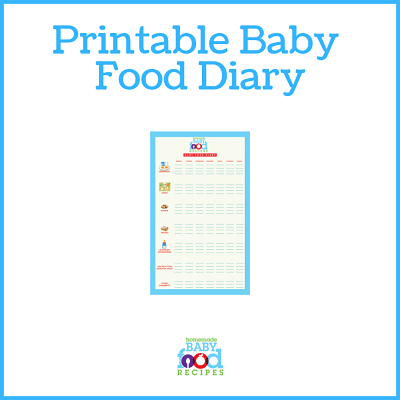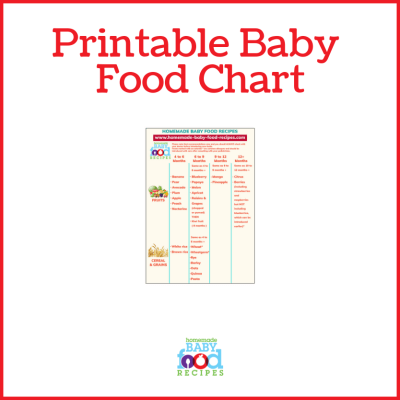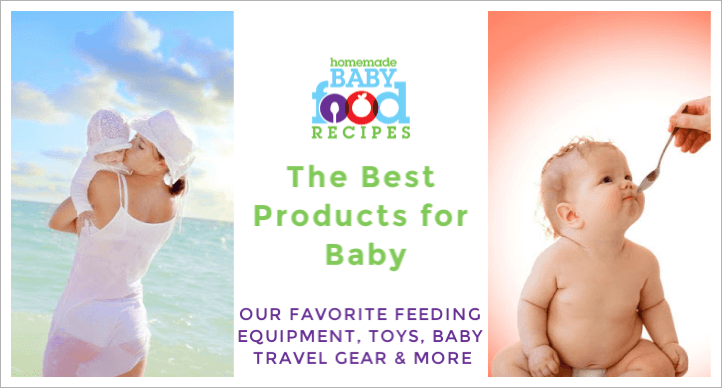Introducing Solids at 4 to 6 Months
Updated: July 09, 2023
On this page you’ll learn about introducing solids at 4 to 6 months, with tips and advice about the best foods to try… and those to avoid!
Introducing solids at 4 to 6 months- is my baby ready?
The current recommendation – from medical authorities such as the American Academy of Pediatrics, UK Department of Health, World Health Organization and UNICEF – is to wait until 6 months of age before introducing solids.
This is because breastmilk or formula usually meet baby’s nutritional needs for the first 6 months of life.
Some pediatricians, however, recommend that babies start solids at 4 months of age.
This conflicting information may pose something of a dilemma for parents and it can be difficult to know which set of guidelines to follow!
If your baby is steadily gaining weight and seems content after milk feeds alone…
… then you may wish to ask your pediatrician about waiting until 6 months to start your little one on solids.
Of course, the age of 6 months should be seen as a ‘guideline’ – there is no magical change in your baby at that time that makes him more able to cope with solids – and babies are unique, so some certainly do develop faster than others!
Yet many parents find that waiting until 6 months or thereabouts to start solids is worthwhile, because by 6 months…
- Your baby’s digestive system is more mature, making it easier for him to digest food and avoid constipation and other digestive discomforts.
- The risk of allergic reactions is lower.
- Your baby is more developmentally advanced, meaning that the tongue thrust reflex is usually absent and your baby can cope more easily with swallowing ‘food’ as opposed to milk.
- Your baby has received a full 6 months supply of milk!
Breastmilk or formula are nutritionally complete for the first 6 months of life, but the quantity of milk your baby consumes may be affected by his starting solid foods.
For breastfeeding mothers, the amount of milk your body makes may reduce, possibly leading to early weaning from the breast.
Please click here for more information about introducing solids to your breastfed baby
In some situations, however, your pediatrician may feel that introducing solids at 4-6 months is necessary to your little one’s healthy growth and development.
Babies with reflux, for example, tend to have problems ‘keeping down’ their milk, which may lead to slow weight gain.
Starting solids at 4 months may both help prevent frequent spitting up and may also help improve weight gain.
You’ll find more information about introducing solids to a baby with reflux here
Premature or low birthweight babies may have feeding difficulties affecting the amount of milk they consume, or may simply need extra calories in order to ‘catch up’ on the nutrition they have missed.
Read more about introducing solids to your premature baby here
Please note: This information is given as a guide only and does not replace professional medical advice.
You should ALWAYS discuss the introduction of solid foods with your child’s doctor. He/she will be aware of your baby’s individual circumstances and is the best person to offer specific advice.
Signs of readiness for solids
- It is usually recommended that babies should be able to sit unassisted before introducing them to solid foods.
If your pediatrician has recommended starting solids at 4 or 5 months, your baby may not be able to sit unassisted – he should, however, be able to sit well with support.
This is important as it enables him to swallow food efficiently. - He should have lost the ‘tongue thrust’ reflex – his natural instinct to push everything out of his mouth that you put in!
It can be frustrating to try to give your baby solid foods if the tongue thrust reflex is still strong and may be one of the clearest indications that he is not ready for solid foods. - An increase in appetite – your baby seems dissatisfied after milk feeds.
- An increased interest in watching YOU eat (although this is often just simple curiosity and doesn’t necessarily mean that he NEEDS solid foods).

Will it help my baby sleep through the night?
It’s quite natural for babies to feed during the night, even after 4 months of age, but some parents are advised to start solids to help their babies sleep through.
(Note: This advice is often given by older family members, yet night time feeding is not, in itself, a reason to start solids. Our page ‘Starting solids – under pressure to start too soon?‘ gives some tips for dealing with advice to introduce solids earlier than you may be comfortable with).
Starting solids purely as a means to help baby sleep through the night can be counter-productive.
If your baby’s digestive system isn’t ready, then it can lead to constipation or other digestive issues – which may keep you and your baby awake even more than usual!
This was the experience of mom Sarah from Houston, Texas, who told us…
I have a 6 month old, and I originally started him on solids at 4 months.
His pediatrician said I could start him on cereal to help him sleep through the night at 4 months, so I did, mixing cereal with breast milk.
I regretted it within 2 days when he started suffering from constipation and discomfort that actually kept him awake longer at night!
I wanted to hold off on fruits and veggies until six months are recommended by my pediatrician, so I decided to stop with solids until his 6 month birthday at the end of September when I would be comfortable giving him fruits and veggies that would assist in digestion.
I gave the cereal a fair shot, trying it for 2 weeks before stopping.
He started solids again at the end of last month and has had no problems, now eating sweet potatoes,carrots, bananas, and apples as well as cereal with plans to include avocado, peaches, and plums in the coming weeks.
The best first foods
Infant rice cereal remains the food most commonly recommended as a first food for babies.
This is because it can be easily mixed to a very thin consistency with either breast milk or formula, providing a manageable texture and a taste that baby is already familiar with!
It is also one of the least allergenic foods, making it particularly suitable for babies starting solid foods before 6 months of age.
Here’s a recipe to make your own infant rice cereal
However, rice can be quite binding and some parents find that it causes constipation in their little ones.
And whilst rice may be one of the least allergenic foods, it is not entirely risk-free, as we discuss on our page – The Best First Food for Baby – Does It Have to be Baby Rice?.
OTHER CEREALS
It is usually recommended that babies are not given cereal – or other foods – containing gluten until they are at least 6 months of age, particularly if there is a family history of Celiac disease or allergies (please see this page for more information).
This means that wheat, barley and rye may be unsuitable for your baby at 4-6 months.
Oats may contain some gluten, although this is because they are often grown and processed alongside other gluten-containing grains.
Please speak to your doctor about the current guidelines in your area for offering oats to your baby before 6 months of age.
With your pediatrician’s consent, you may wish to start your baby’s journey into the world of solid foods with pureed fruits or veggies instead of cereal!
Some ideal first foods when introducing solids at 4 to 6 months include
- banana
- avocado
- sweet potato
- butternut squash
- carrots
- apple
- pear
PEANUTS
Experts in the US are now recommending that some babies be introduced to foods containing peanuts as early as 4 months of age, as this is now believed to help prevent nut allergy.
This may seem worryingly early to introduce a food that has – until recently – been on the ‘forbidden’ list, precisely because peanuts were believed to TRIGGER nut allergy when introduced too early.
Please see this page for more information on the current guidelines for introducing peanuts – and please do speak to your doctor about these new recommendations.
Do I need to cook ALL fruits and veggies?
Banana and avocado do not need to be cooked (making them the ideal convenience foods for babies!)
All other fruits and veggies (including apples and pears) should be cooked for your baby until he is AT LEAST 6 months old.
This is partly because cooking produce helps break down the cell walls (making the food easier to digest and to puree!) and also because cooked fruits and veggies are less likely to provoke an allergic reaction than raw.
Please see this page for more information about serving uncooked fruits and vegetables to your baby
Do I need to peel ALL fruits and veggies?
When introducing solids before 6 months of age, it’s important to remember that your baby’s digestive system is still relatively immature.
So it’s best to avoid peel, which can be difficult to digest.
Later on, however, you may like to think about leaving certain fruits and veggies unpeeled – particularly if you buy organic!
You’ll find lots more information here…
Should I peel fruits and vegetables for my baby?
Preparing the food
If you are offering rice cereal to your baby…
Then simply mix it with enough breast milk / formula to achieve the consistency you desire.
For very young babies, you may like to create a fairly runny texture, which you can gradually thicken as you gauge your baby’s ability to deal with a little more texture.
If you are offering apples or pears to your baby…
Just peel, core and dice them, then simmer in a VERY little water – or steam them – until tender.
Cooking fruits and veggies until they are just tender ensures that you preserve as many of their nutrients as possible.
Transfer to a food processor and puree, adding a little cooking water to create a thinner texture if necessary.
If you are offering avocado or banana to your baby…
Then simply remove the skin and mash or puree the flesh of the fruit, thinning it with a little breastmilk or formula if necessary.
If you are offering sweet potato, butternut squash or carrots to your baby…
Then peel and dice them and simply steam or simmer the cubes in a little water until tender.
Transfer to a food processor and puree, adding back a little cooking water – or breastmilk/formula – to thin the texture if needed.
Alternatively, you can bake them.
We like to bake sweet potatoes in their skins (just wash them and prick them with a fork, then bake at 375 deg F or 190 deg C until they feel soft – usually 45 mins to 1 hour, depending on the size).
You can bake butternut squash whole, too.
Just pre-heat your oven to 350 deg F (180 deg C) and put the squash on an ungreased baking sheet.
Pierce it all over with a fork to allow the steam to escape (otherwise it may explode!) and bake for around an hour, until tender.
Cut in half lengthwise, then scoop out the seeds and fibres.
The flesh can then be scooped from the peel and is ready for mashing or pureeing!
Our favourite way to bake carrots is the easiest way too – we just cut them into sticks, wrap them in foil and let them cook in their own steam!
They take about 20-30 minutes in an oven set at 375 deg F (180 deg C).
Butternut squash baby food ideas
If you make more baby food than your little one can eat in one sitting, you can store the rest in the fridge for 24 hours, or transfer it to the freezer instead!
Freezing extra baby food makes it easy to create a whole batch of meals all in one go!
Learn more about how to freeze baby food or visit our Baby Food Preparation and Storage page.
Baby’s first meal
You should introduce all new foods to your baby separately – at least 4 days apart.
This helps you easily identify the cause of any allergic reaction or digestive problem.
If you introduce two types of food to your baby within the space of only a day or two – and he experiences any type of unwelcome reaction – then it will be difficult to tell which food was responsible.
Certain foods are more likely than others to trigger allergic reactions or digestive discomfort and it is particularly important to avoid them if your baby is starting solids before 6 months of age.
Please see our list of baby foods to avoid for more information.
Begin baby’s first meal by offering him his usual milk feed… milk continues to be the most important part of his diet.
You may offer your baby his first taste of solids at any time of day, but we’ve always found the mornings to be best as babies tend to be happier and more receptive to new experiences!
Note: We recommend offering new foods for the first time on a weekday – rather than a weekend – and never on a public holiday!
Why?
Because in the unlikely event that your baby suffers a reaction to a food and requires medical attention, it will be easier to seek help or advice during ‘normal’ working hours!
To get started, sit your baby in a suitable highchair – or even on your lap!
Use a soft, rubber-tipped spoon to offer your baby his first bite (or you can even use your finger!). Either will be kind on his delicate gums.
Offer only a small amount of food…
…anything from a teaspoon to a tablespoon is plenty at first.
And don’t panic if your baby refuses this new experience!
Stay calm and relaxed (remember, introducing solids should be fun for you both!) and simply try again the following day if your little one doesn’t appear to want to eat, or keeps pushing the food back out.
Do bear in mind, though, that if he continues to refuse food, then he may simply not be ready for solids yet!
And it’s also worth remembering that some babies need to try a new flavour up to ten times before accepting it.
So, if he seems able to take the food into his mouth without difficulty, but then spits it out with a look of disgust, don’t be deterred from trying the same food again a week or two later!
Watch for signs that your baby has had enough to eat…
These include turning his head away and refusing to open his mouth.
Always respect your baby’s signals and don’t force him to eat – this can lead to problems in the future and may make your baby wary of mealtimes altogether.
As with so many aspects of feeding your little one, the best judge of how much to feed your baby is your baby himself!
We discuss this in more detail here – How Much Should My Baby be Eating?
And do remember that, at 4 to 6 months, a baby should still be consuming around 24 to 40 oz of formula per day, or nursing often and on demand (please speak to your doctor for more specific guidelines relating to your baby).
As your baby becomes accustomed to enjoying solid food, you can slowly increase the amount and texture of the food you offer.
You can also create new flavour combinations by mixing together purees of food he is already enjoying (apple and pear, for example).
Keep things simple for now, until your baby is around 6 months of age, when he can start enjoying a wider variety of foods,flavours and textures – visit our page 6 to 9 Month Baby Foods for ideas and inspiration!
Simple Puree Recipes from our Blog
We hope that this information regarding introducing solids at 4 to 6 months has been helpful – by making your own, healthy baby food, you are building a wonderful foundation for your little one to enjoy a lifetime of healthy eating!
You’re very welcome to contact us if you have any comments or questions!
Other parents experiences…
From mom of three, Sara Lise Raff
I began my children on solids at the age of four months. It is my understanding that children with no allergies or no parents with allergies may begin solids that early.
I found that by trying cereal once a day at 4 months helped my children to master eating skills.
Getting children to take food from a spoon is important to develop the muscles around the mouth and the tongue and can even begin to get children to strengthen the trunk of the body by beginning to sit up to eat.
Starting solids early also led my children to try finger foods earlier, to help develop the pincer grab (self feeding a cheerio or raisin).
I also introduced a sippy cup at about 5 months and by 6 months my children no longer used bottles.
I have no regrets about my choices.
While each one of my children developed feeding skills at their own rate, I tried to give the same opportunities at about the same ages.
From Alison Simard from Los Angeles…
I have 2 children, a son who is almost 6 (Ethan) and a 7 month old daughter named Daisy.
The first time around I followed doctor’s orders and started after 6 months old and was religious about following the current trends about what foods to offer first and in which order… I think it was cereal, avocado, banana and then I primarily fed him Earths Best Organic jarred food unless it was something easily mashable like avocado (his very first vegetable) or banana (his first fruit).
This time Daisy started solids just before 5 months and she just loved it.
It wasn’t a plan but she was so alert and grabbing for my spoon while watching our family eat.
Although my son has slight allergies to soy milk (boys shouldn’t have too much soy, anyway) we don’t have any major food allergies in our family, so I wasn’t overly concerned that Daisy might.
As a breastfeeding mom, I realized that feeding her is a way that the rest of the family can be involved and have Daisy time.
I was inspired this time to buy a Beaba baby food maker and now regularly steam and pureed organic fruits and veggies and put them in the freezer… I love knowing exactly what’s in his food and saving money in groceries.
I never thought I had the time for that with my son but it seems so much easier than shlepping heavy baby bottles!
Now that it is the 2nd time around there are other things we’re doing earlier too… Daisy’s already drinking directly from a glass (with assistance of course) and although we had plenty of left over sippy cups and baby bottles she just grabbed for our glasses as if to do it our way.
When she turned 7 months old she developed stranger anxiety which is typical at that age, wanting no one but mommy to hold her, etc.
As a breastfeeding mom who needs to work and be present for an older sibling that is the kind of thing that can really be exhausting but I must say, her ease and ability to take food and drink from someone aside from me is sometimes the real distraction I need to get things done.
I do feel that it is important to note that since I am a big advocate of breastfeeding and that I am aware that breastmilk should still be her first line of nutrition at this age and I really want to keep my milk levels up, I am very careful to nurse her before she gets other kinds of foods.
But, it’s a regular party around here.
She has had small tastes of her big brother’s ice cream or frozen yogurt. Its fun for Daddy to spoon her some peas while we have dinner.
I must say she is often insensed to see us eat without her and grabs for our spoons and cups if they’re within reach!
From mom of twins, Renee Rosiak…
My husband and I introduced our boy/girl twins to solids when they were 5 months, basically two weeks ago.
Our pediatrician told us that once our son starting drinking 8 oz. of formula that it would be time.
We also knew it was time because my son was watching me eat my food as if he were a hungry dog.
He literally watched the path the food on my fork would take from the plate to my mouth!
Once, he was sitting on my lap while I was having a bowl of oatmeal.
I was curious so I moved the spoon of oatmeal toward his mouth to see what he would do.
He opened wide. I knew for sure then that he was ready.
But of course there is my daughter who is several pounds lighter than my son.
We knew she probably wasn’t ready as she wasn’t drinking 8 oz. yet.
But our pediatrician said that once my son started then it would be easiest on us to start her at the same time.
She didn’t like the rice cereal and cried when we tried to feed her.
I’d give her a few spoons worth and then would switch to her formula.
But once we started on pureed veggies, she loved it.
We can’t get it into her mouth fast enough because she’ll start protesting if we pause for an extra second!
We are about to enter week three and they seem to be doing well.
My daughter has slept through the nights a few times (she usually wakes up at least once) and my son, as usual, sleeps for about 10-11 hours straight.
Ultimately, I know firsthand that suggested timelines are not hard and fast.
It’s best to be flexible with them and watch the baby carefully to make sure he or she is ready for the next step.
From mom of four, Jenn Ormond…
I gave solid foods to my first born son a little over 4 months, probably closer to 5.
I did this because my pediatrician told us to and I was a new mom who did everything right.
When he was 18 months old we discovered he had a tree nut, cashew, pistachio, and mango allergy and we had quite a few trips to the emergency room.
Because of his allergy I started to do some research as to why.
Introducing solids too early is one of the theory’s out there among gazillions of others.
So introducing solids later is one thing I could actually do with my other three – my 3rd and 4th children got solids even a bit later than 6 months, closer to 7 because they had so many allergies at a VERY young age.
So I learned that allergies come with my kids regardless of what I did during pregnancy, breast feeding and the time line of solids being introduced.
I don’t regret any of my decisions because I did what I thought was best for each child know what I knew then.
I will admit I don’t always go with what the pediatrician recommends based on my research and experience and so far so good.



